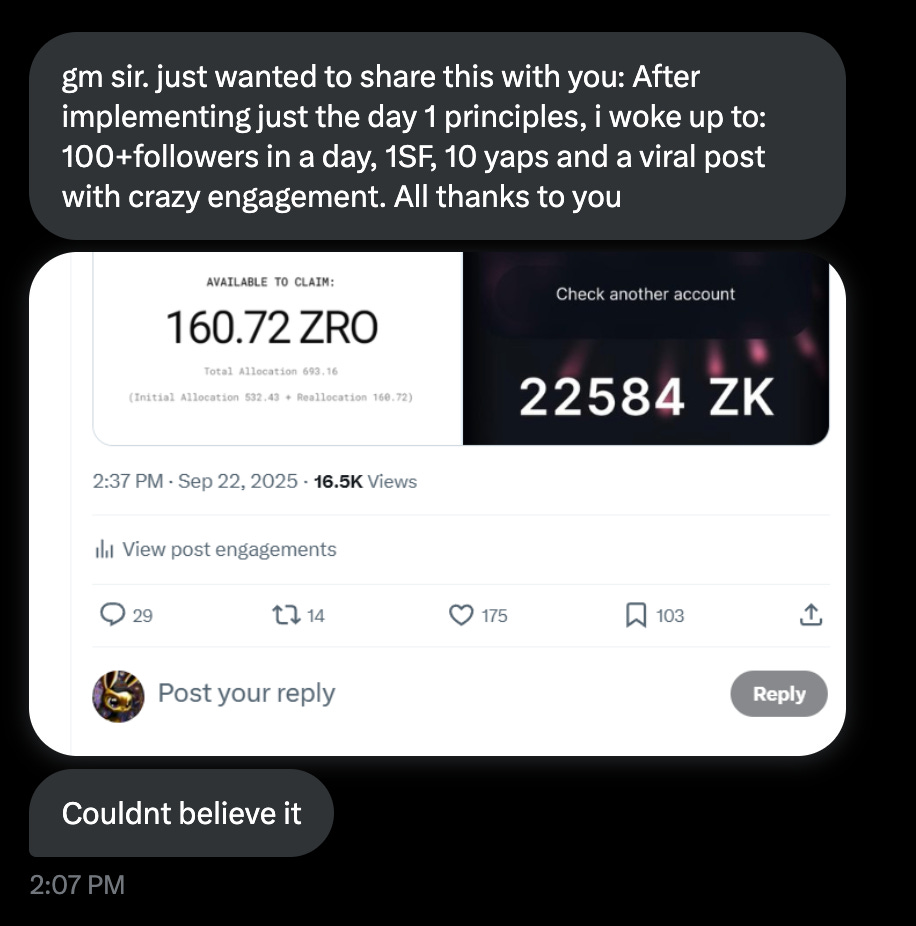The fastest way to kill your social reputation is monetising too early
InfoFi has made it easier than ever to destroy your brand.
So many opportunities are available to yappers, but that doesn’t mean we have to chase every single one.
Judgment now plays an important role in choosing which project to yap about.
Because it says a lot about your brand and who you are as a person.
The key to winning the InfoFi game is to monetise without losing trust.
Caleb Ralston (the man behind Alex Hormozi and GaryVee) shared the most ideal approach to monetisation, and here are my key takeaways:
Don’t make the mistake of monetising too early
Brands that win sustainably don’t chase short-term revenue.
Instead, they choose to build long-term trust with their audience.
Trust is the most valuable asset any brand can have:
It’s the currency that’s required for a follower to make a transaction.
But if we monetise too early (such as becoming a paid billboard for any InfoFi project):
It will only result in us burning our audience and degrading trust.
Others will start to get annoyed with our posts and may even mute or block us.
So I’m choosing to do this instead:
Provide an unbelievable amount of value upfront
I define value as solving a pain point for someone.
Choose to continue solving problems for a specific person (like your former self), and you’ll deliver immense value to him/her.
Since you’re giving away all this value for free, they can’t help but give back to you one way or another.
So instead of cashing out early, choose to optimise for long-term retention:
I want to build a strong relationship with my followers/fans that lasts months (and not just days).
So it all depends on what we do and how others perceive us:
Protect your reputation at all costs
It’s harder to rebuild trust than to maintain trust.
Every project we associate ourselves with will either increase or decrease trust.
So we need to be extremely careful with who we pair our brand with.
I’m probably the biggest fool for not ranking on every Yapper leaderboard out there.
But it all depends on how much value we can give to our audience through a specific project that we talk about:
Are we just shilling it for the sake of a paycheck, or does it really add any value to our followers’ lives?
I strongly believe in talking only about the projects that we interact with, and not anyone who pays us to write about them.
I find that documenting how we interact with a project is the best way to not sound like a paid ad.
If we know that a project decreases trust with our audience:
Then it’s likely not worth associating with (or yapping about) it.
Yes, it’s very possible that your followers may forget about your post in the long run.
But they will have a long-lasting impression on you based on what you posted previously (and that’s extremely hard to change).
Missing out on these short-term wins can suck, but we’re waiting for larger returns in the future:
Play the long-term game
Caleb gave this advice to anyone who wants to enter this game:
Do not expect any economic outcomes that you desire for the first 36 months.
Many want to monetise as soon as possible, especially with so many Yapper leaderboards now available.
But so long as you don’t need the money immediately:
Choose to play the long-term game and build a sustainable brand (instead of cashing out at every opportunity).
3 years is definitely a long time (I only started being serious about Twitter in July 2023):
But it helps you get used to the volatility of having zero returns for your output.
We still rely on a lot of factors we can’t control (like the algo spreading our content), so there will be days where we get zero views or traction when growing our account.
Many would give up with the poor results during the first few months.
But building a social presence requires compounded growth:
All of your efforts at the start are the catalyst for explosive results once a content piece takes off.
Value first, monetisation later
The recent Kaito changes seem to have disadvantaged small creators, especially with the reputation thresholds.
But I believe that as a small creator, monetisation should not be your number one priority.
The longer you can wait before you monetise, the greater the returns you’ll get in the future.
Above all else, I would optimise for value and not views.
Once we have built enough social capital based on the value we provide:
The monetisation opportunities will come.
It could even unlock opportunities that we’d never think are possible.
This is the exact framework I’m using to build long-term wealth with my brand that I shared here:
Here’s the link to the full 6-hour video, but the part on monetisation is at the back:
The 30-day challenge to go from zero to Signal Creator
Want to capture the next wave of airdrops? You need both onchain and social reputation.
Stop wasting hours on low-value tasks and start building habits and systems that projects will reward with bigger airdrops.
Build the foundations for a reputable brand in just 30 days with one actionable tip you can implement each day.
It’s time to stop burning out on low-value tasks:







